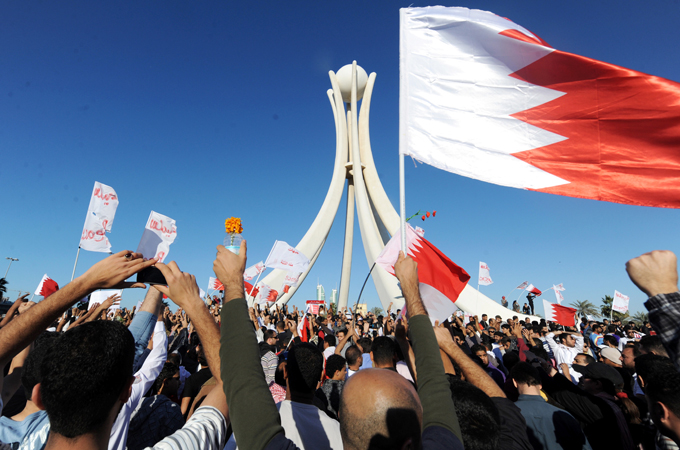Bahrain king orders ‘fact-finding’ committee
King says independent committee of international human rights activists will probe protests that began in February.

 |
| Protests which erupted in February prompted a major security forces’ crackdown across the country [EPA] |
Bahrain’s king has ordered that an independent fact-finding team be formed to investigate the weeks of protests that hit the tiny Gulf island country earlier this year, the state news agency has reported.
The announcement from King Hamid bin Isa al-Khalifa comes ahead of a national dialogue process, due to begin on Saturday, which the government says is a chance for reforms to be tabled and reconciliation between political and sectarian forces.
Opposition leaders did not immediately respond to the announcement from the king and have yet to signal whether they will attend the national dialogue on Saturday.
 |
| Click here for more of Al Jazeera’s special coverage |
“We still need to look at what happened to know all the details of February and March and evaluate those events as they really were,” al-Khalifa said, speaking at an extraordinary cabinet session on Wednesday.
The king said that the decision had been taken after consultations with the UN High Commissioner of Human Rights, and that the committee would “be formed from internationally reputable figures well-versed in international human rights law”.
He said that no member of the Bahraini government or anyone who was part of the “domestic political arena” would be a part of the committee.
“The committee will carry out its tasks and responsibilities, as defined after consultation with the members themselves in absolute independence without any intervention of any form, to present its report to me to take the actions necessary,” he said.
“For there were victims of violence whom we cannot forget … A lack of confidence has prevailed and vision has been blurred by rumours.”
Bahrain’s Sunni rulers have accused the pro-democracy protesters in the country of having a sectarian agenda, accusing regional power Iran of supporting them materially.
Nabil Rajab, a leading activist and head of the Manama-based Bahrain Centre for Human Rights, however, rejected out of hand the king’s announcement.
“I don’t think the king himself is capable of forming an independent and transparent committee [as] the person who declared the state of emergency, which is responsible for most of the crimes against humanity committed in our country,” he told Al Jazeera.
Rajab alleged that the government’s intention was to “bypass the committee that is supposed to be formed by the United Nations”.
“I don’t trust … the intention of the government in forming this committee. I think we need an independent committee, hosted or sponsored by an international organisation like Human Rights Watch or Amnesty International.
“We’re going to deal with this committee as a fact, but we don’t think it is an independent [body].”
Regarding the dialogue process, Rajab said that the fact that the government itself was not taking part, preferring instead to set the process up as a forum for groups to talk to one another, was indicative of its stance of projecting the issue as a sectarian, and not political, one.
“[The people’s concerns are] about power, about politics, about participation, about constitution, about will, and the problem is with the government, represented by the king [and] prime minister, not with the people of Bahrain. This dialogue … if the government is not represented in it, it’s not a dialogue,” he said.
Tribunal adjourns
Meanwhile, a special security tribunal that is handling the appeals of 21 opposition leaders who have been convicted of plotting against the state adjourned proceedings on Wednesday until September.
The next appeals hearing is now set for September 11, but it appears unclear whether this will have an effect on Al-Wefaq, the main opposition bloc, in terms of participating in the planned reconciliation talks.
The United States has encouraged a process of dialogue in the country, which is home to the US Navy’s Fifth Fleet.